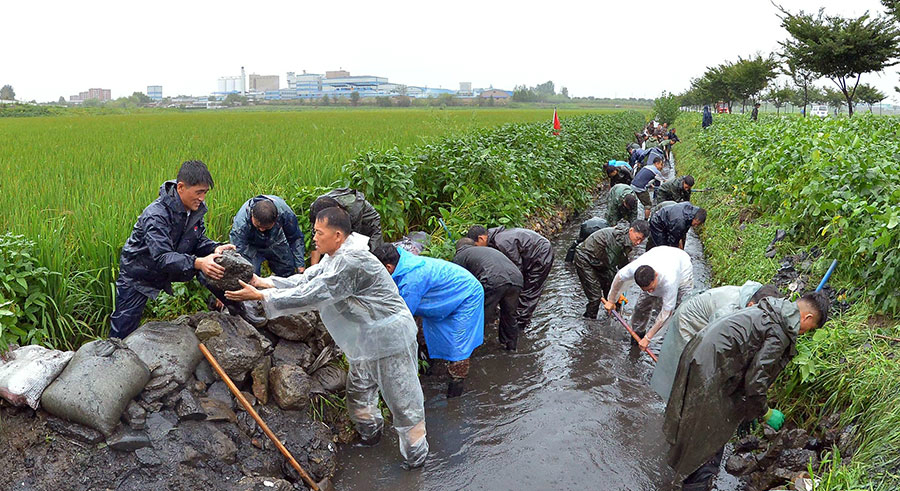About the Author

Dagyum Ji
Dagyum Ji is a senior NK News correspondent based in Seoul. She previously worked for Reuters TV.

The North Korean government this year established and completed its 2019-2030 national environment protection and disaster risk reduction strategies, the country’s state media reported on Friday.
The announcement was made by an unnamed North Korean chief delegate at the UN Climate Action Summit 2019 held on Monday, party daily the Rodong Sinmun and the Korean Central News Agency (KCNA) reported.
“He said the government of the Democratic People’s Republic of Korea completed the 2019-2030 national environment protection strategy and national disaster risk reduction strategy this year,” the outlets said.
“Struggles have been vigorously waged to realize those plans.”
NK News was unable to independently verify that a DPRK delegation participated in Monday’s summit. A draft agenda for the summit, notably, does not name North Korea as taking part.
Despite this, Friday’s reporting appears to be the first confirmation by the North Korean media of the establishment of the two new strategies.
Hints at a new disaster response system in the DPRK came in the country’s comparatively swift response to damage caused by Typhoon Lingling earlier in the month.
Ahead of the storm’s making land on the Korean peninsula on September 6, leader Kim Jong Un convened an emergency enlarged meeting of top military officials in which he “analyzed the situation of nationwide crisis management against the natural disaster.”
The following day, state-run broadcaster Korean Central Television (KCTV) aired special programming to relay information on Typhoon Lingling every two or three hours.

North Korea passed a law on “Disaster Prevention, Relief, and Recovery” in 2014 — the country’s first disaster management law, according to the International Federation of Red Cross And Red Crescent Societies (IFRC).
The passage of the law also led to the establishment of the country’s first State Committee on Emergency and Disaster Management (SCEDM).
North Korean state media on Friday also reported on the country’s plans to reduce carbon dioxide (CO2) emissions.
“Our Republic government is setting the goal of reducing the amount of carbon dioxide emissions by 16.4 percent every year… by 2030,” state media reported, quoting its unnamed chief delegate as having said.
“We are also planning to additionally cut greenhouse gas [emissions] by 36 percent, while actively promoting international cooperation based on the Paris Agreement on climate change.”
Pyongyang ratified the United Nations Framework Convention on Climate Change (UNFCCC) in December 1994, the Kyoto Protocol in April 2005, and the Paris Agreement in August 2016.
As part of the effort, the media reported, the North has under the leadership of Kim Jong Un been “vigorously pushing forward works of turning all mountains into mountains of gold and treasure by vigorously waging forest restoration campaign.”
That campaign was launched by Kim in his work “Let the Entire Party, the Whole Army, and All the People Conduct a Vigorous Forest Restoration Campaign to Cover the Mountains of the Country with Green Woods” published in February 2015.
In April 2012 — just months after coming to power — the DPRK leader ordered that all bare mountains be turned into woodland within 10 years.
Speaking at a meeting with senior functionaries, Kim described this goal as the “party’s firm determination and will.”

State media on Friday reported that the DPRK chief delegate on Monday also “clarified the Republic government’s stance to actively join in international efforts pertinent to global climate change issues and environmental protection.”
The “continuous abuse of resources and environmental destruction is posing huge risks to the survival of humankind these days,” he said.
“The fact that the hottest five years from 2015 have been recorded due to a rise in temperature shows that climate change is a serious international problem that can no longer be postponed.”
The chief delegate also “mentioned that UN member countries should deal with climate change issues from a moral and ethical point of view, and some countries are intentionally turning away from climate change issues, giving priority to their economic interests.”
Developing countries are overwhelmingly the victims of the climate change, the North Korean speaker continued, adding the amount of damage is “beyond expectations.”
“He contended that developed countries should admit responsibility for generating climate change problems and fulfill their duties… in solving them.”
Pyongyang previously criticized U.S. President Donald Trump’s decision to withdraw from the Paris Agreement, with a foreign ministry spokesperson in June 2017 describing it as the “height of egoism.”
Edited by James Fretwell and Oliver Hotham
Featured image: KCNA

Dagyum Ji is a senior NK News correspondent based in Seoul. She previously worked for Reuters TV.
Join the influential community of members who rely on NK News original news and in-depth reporting
Learn MoreEnter your details below
Don't have an account? SIGN UP
Join the influential community of members who rely on NK News original news and in-depth reporting
Learn MoreAlready have an account? SIGN IN
Join the influential community of members who rely on NK News original news and in-depth reporting
Learn MorePlease enter your username or email address. You will receive a link to create a new password via email.
Don't have an account? SIGN UP

Specialist news and analysis,
research tools, and unique data sets
Internet Explorer is not compatible with this website. We instead recommend using Chrome, Edge, Firefox or Safari.
Microsoft ceased supporting IE 10 and older in 2016.
In addition, Microsoft cyber-security chief Chris Jackson has been urging users to stop using the browser since February 2019.
